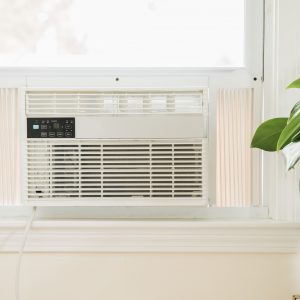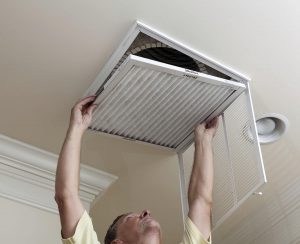What is air conditioning?
In 1908, the ‘father of air conditioning’, G. B. Wilson defined air conditioning as being able to:
- Maintaining a suitable humidity in all parts of a building.
- During certain seasons, freeing the air from excessive humidity.
- Being able to provide a constant and adequate supply of ventilation.
- Removing from the air, any micro-organisms, soot, dust and other ‘foreign bodies’.
- During warmer seasons, efficiently keep the indoor air cool.
- Have the potential to at least partially warm rooms in the winter.
- Air conditioning should not be too expensive to buy or maintain.
How does air conditioning work?

Air conditioners work by moving the heat from inside your office or workplace, outside. It then blows cool air back into the building. The way the machine cools the air is through blowing it over a set of cool pipes, called an evaporator coil. It works on the same basis as a fridge or when water evaporates from the skin.
The evaporate coil is filled with coolant or refrigerant, which changes from a liquid to gas as it absorbs heat from the air. This is then pumped through another coil to the outside of the building, where it cools and returns to its liquid form. This outside coil has aptly named the condenser as a result.
There is a pump, called the compressor, which moves the coolant between the two coils, as well as changing the pressure of the coolant to ensure it all evaporates and condenses in the appropriate coil.
The motor that runs the compressor uses all the energy needed to complete this and the system will usually give out three times the cooling energy that the compressor uses. This is due to changing the state of the coolant from liquid to gas, allowing much more energy to be moved than the compressor uses.
What is a ‘Ton’ of cooling?
Cooling was achieved by storing big blocks of ice before the invention of air conditioning. When air conditioners started to be used instead, they were measured by the equivalent amount of ice that would have melted in a day, giving us the term ‘ton’ for measuring air conditioning.
What are air conditioning filters?

Most air conditioning systems have a filter above the evaporator coil that removes particles to keep the air conditioning system clean and remove particles from the air.
As it does its job, the filter will become loaded with more random particles, reducing airflow. If filters are left unchanged, the airflow will decrease, and they become a new source of air pollution.
The best way to deal with decreased airflow is to regularly change your air conditioner’s filters to ensure it remains efficient.
How to further increase your air con’s energy efficiency?
One of the biggest things you can do to maximize the efficiency of your air conditioning is to seal any leaking ducts, along with maintaining clean filters and cleaning the coils.
Another way to maximise the efficiency of your air conditioning is to make sure nothing is blocking the air flow of your air conditioner. By buying an air conditioner matched for your climate (not that much of an issue here in the UK), you can ensure that you’re not using unnecessary energy powering it.
Make life easier for your air conditioning unit
By reducing the amount of work your air conditioner has to undertake, it can provide you with better results.
By increasing the level of your building’s insulation or reducing other air drafts, you can reduce the energy spent on heating and cooling.
The use of high-efficiency products if you have to renovate or rebuild parts of your building will also help your air conditioning.
On the inside of your building, you can improve the efficiency of your air conditioning through simple tasks such as turning off electrical appliances when you’re not using them.
Make use of the extraction fans in your kitchen and bathroom to remove excess humidity in those rooms, and energy-efficient appliances will all contribute to the efficiency of your home.
The power of ventilation
Without allowing your building proper ventilation, stagnant air has the potential to lead to comfort and significant health problems. It’s generally recommended that your building has enough ventilation to exchange the air inside at least every four hours.
One of the positive outcomes of older homes having drafts is that they probably don’t need help with ventilation, whereas modern homes will need help to meet minimum ventilation standards.